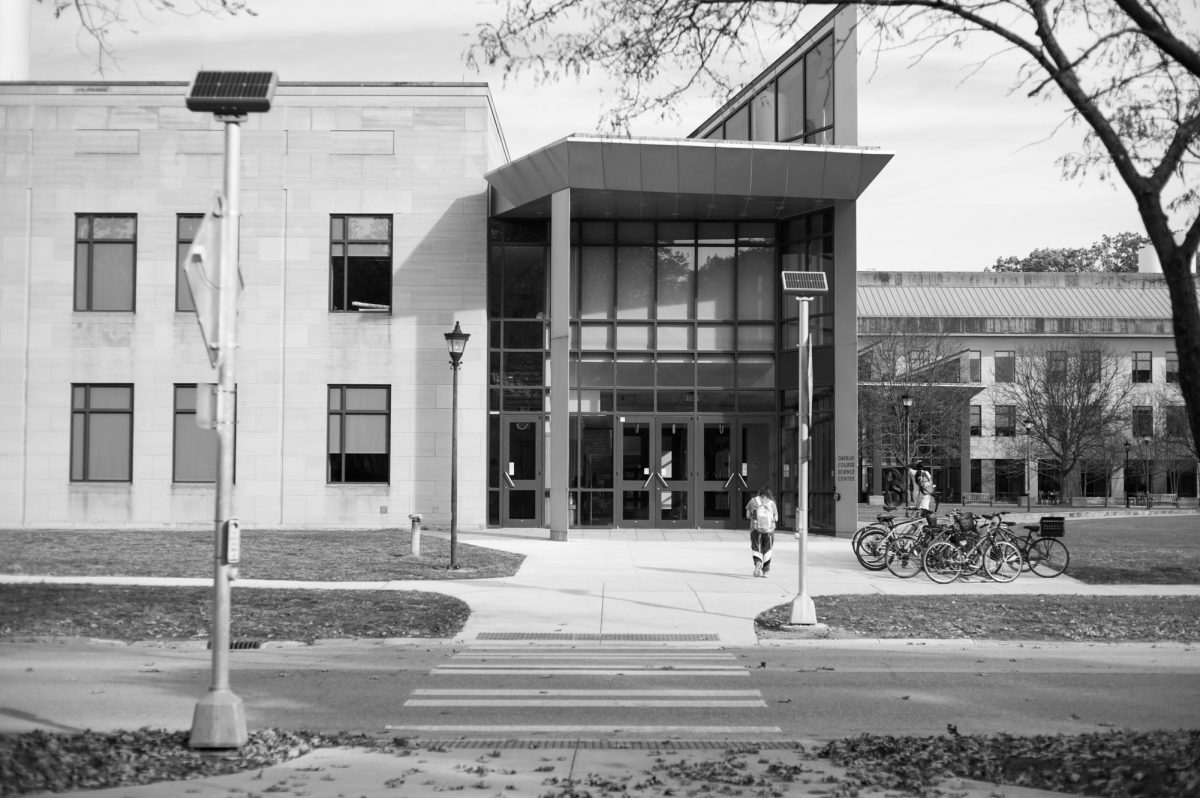This year, College students saw a long-anticipated improvement to the walking patterns of Oberlin through the addition of a crosswalk in between the Science Center and Wilder Hall. Where once there were a number of signs stating “Do Not Cross,” there is now a flashing light of approval for student convenience. However, students seem to ignore the new approved zone, not even crossing at the new sidewalk.
More than ever before, students are crossing about 40 feet to the right of the sidewalk through the lot next to Daub House. This pointless, lazy crossing has resulted in drivers having to slam on the breaks for students that feel so important that everyone must stop for them on the road, regardless of the sidewalk. They show no regard for their own safety or the safety of others, not to mention slowing traffic even more. That section of the road alone has three crosswalks already, now cars must stay on high alert for pedestrians any number of times more than that. When talking casually with friends who drive, they describe a phenomenon of hating drivers when they walk and hating walkers when they drive. Why is this? Why can we not just find a mutual respect between drivers and pedestrians?
Being someone who grew up in a rural area, all of this seemed like common sense to me. When watching other students cross with no regard for the drivers, I was baffled as to why they would be so rude to these strangers and why it is so hard to walk a few feet in another direction to use a crosswalk. I wondered if it was laziness, lack of empathy for others, a statement against authority, or just brattiness. But, after reading Luca Johnson’s Grape article, “The Oberlin Jaywalking Culture Clash,” it finally occurred to me that many students literally don’t know any better. They are from a city, or didn’t get out much before, and now feel entitled to on-campus road space that isn’t theirs. While it is an interesting insight, I still don’t think it excuses the behavior.
Imagine you are a local trying to get to work at Mercy Hospital. You need to be there a little before 10 a.m. for your shift, and the only way to get there is by driving past the Science Center. Now you are driving during a class rush, so you need to stop at all three crosswalks on just that part of the street. The stream of students doesn’t stop for many minutes, and you are left sitting there at the first crosswalk for an upsetting amount of time. Now, you have finally made it past the first crosswalk when, suddenly, there is a stream of students flowing into the streets in front of you where there are no crosswalks. You are left to wait there. Then you stop at the next crosswalk, and then the next, and now you are late to work. That road itself is frustrating for drivers, even without all of the jaywalking. Now imagine that same scenario but you are a mother trying to take her injured, choking, or otherwise suffering child to the only hospital nearby. Where in the first scenario you are frustrated, in the second you are panicked. The inconsiderate nature of jaywalking can often be more impactful than just an inconvenience due to its location. We as a student body cause a clog of traffic in front of a hospital without any regard for the possible consequences we will never see. While the unfortunate placement of things is not our fault, we are what causes the impact, and we as a student body can either make things easier or more difficult for the people that live here.
Mercy Hospital isn’t something the student body typically thinks about. We have Student Health Services, so we typically have no reason to go there unless you’re a first-year who has to park there or have some rare emergency. But, for locals, this is a necessary service where necessary care is provided. So it baffled me when, a few weeks ago, I watched a swarm of students in a rush run in front of a flashing ambulance, as though their getting to class on time was more important than the life that was at stake.
The student body is stereotypically entitled. There is often an expectation that the world should change to accommodate us. When it comes to important cultural phenomenons, this attitude can make sense and can be a strong attribute, but this mentality seems to follow into situations where it doesn’t need to apply. Being in a new social environment, such as a rural area, requires social adjustment. We as a student body cannot expect that we are the only people that matter here, and we need to contextualize our actions into what may be a new environment for some. By not doing that, we are proving the negative stereotypes about this school and its students correct.
Similarly, bikers who do not think they need to follow the same rules as cars when on the road almost hitting pedestrians and causing accidents by turning illegally or winding on and off sidewalks without looking is an issue.
The student body should reflect inward as to why they are so unwilling to walk or bike a few feet to the side to be kind to others. No matter the reason, if a car needs to stop for you when you are not on a crosswalk, you are crossing the road wrong. We need to remember that, while we are here as students, we are not the only ones in this town with places to be and people to see. The locals deserve more respect than they are given by students, and this is just one of many ways that respect is not given. We are visitors in their space and they are nice enough to accommodate us in their businesses and public spaces, so we as students should be more respectful of their community standards and take the time not to deliberately inconvenience — or worse, harm — others.



